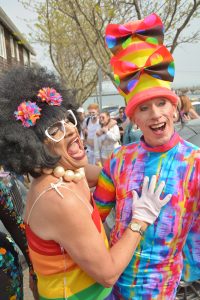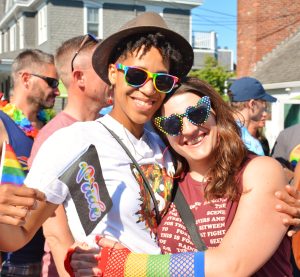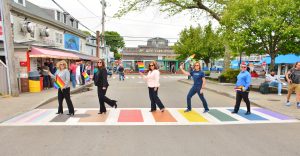Story By CALLI REMILLARD • Photos By DAN MCKEON
For reasons that go beyond phonetics, Provincetown and Pride are synonymous.
A land far beyond the likes of the bustling city of Boston, the tip of Cape Cod is a land like no other. For decades it’s been regarded as a haven for LGBTQ+ people and creatives, but the queer history of the tip of Cape Cod long predates the Pride Parade and carnivals that the hundreds of thousands of annual visitors are used to seeing today.
 Long before it became known as a queer safe space, the lands belonged to the indigenous Wampanoag and Nauset tribes. As agriculturists and fishermen, these tribes truly began the culture of Provincetown, which over hundreds of years morphed from native lands to early societies.
Long before it became known as a queer safe space, the lands belonged to the indigenous Wampanoag and Nauset tribes. As agriculturists and fishermen, these tribes truly began the culture of Provincetown, which over hundreds of years morphed from native lands to early societies.
By the 1860s, the outermost tip of the Massachusetts peninsula was largely engrained as a Portuguese fishing and whaling village. Some of the first Portuguese immigrants were sailors who, within decades, had taken over the fishing industry of the area.
The distance between the heavily Portuguese-Catholic fishing village of the late 1800s and the gay paradise of Provincetown today is a tough one to bridge, but with the narrative assistance of Provincetown Business Guild executive director Stephen Hengst, it’s much easier to take a stroll backward through time and understand how Provincetown’s gay culture really came to be.
“This is something that we have been exploring actively at the PBG right now because while Provincetown has been a destination for the LGBTQ+ community for so many years, not many people fully understand why and how that came to be,” Mr. Hengst said. “We’ve been spending a lot of time speaking with community members, trying to help them understand the history that helped P-town develop.”
It all started with a storm. In 1898 a tempest known as the Portland Gale tore through an already struggling Provincetown, wiping out half of the town’s wharves and sinking more than a dozen boats in the harbor. The years prior to the hurricane had seen a decrease in fish prices, bringing about a depression in the 1890s. What had once been an affluent community was now decimated both in infrastructure and economic stability.
“What ended up happening was Provincetown’s economy collapsed and the fishing industry vanished almost overnight at the scale that it had been operating,” Mr. Hengst said. “And unfortunately, it created an entire community in Provincetown of widows because many of the men that worked on these ships died in the storm. So many of the Portuguese widows suddenly found themselves in a situation where husbands were gone, many of the shops in town were suffering because money was no longer coming in, and Provincetown’s economy retracted very quickly overnight.”
 What surely seemed like the end of the thriving community of Provincetown, however, was actually just the beginning of a colorful new chapter. About a year after the Portland Gale devastated Provincetown, an artist named Charles Webster Hawthrone came from New York to open the Cape Cod School of Art, the first outdoor summer school for figure painting.
What surely seemed like the end of the thriving community of Provincetown, however, was actually just the beginning of a colorful new chapter. About a year after the Portland Gale devastated Provincetown, an artist named Charles Webster Hawthrone came from New York to open the Cape Cod School of Art, the first outdoor summer school for figure painting.
“Charles Webster Hawthorne recognized that Provincetown was this very unique place,” Mr. Hengst said. “It was a perfect place for artists and creatives at the end of the world, with beautiful light, expansive vistas and it offered what he felt was the perfect environment for someone to come and make art. And he recognized that Provincetown’s economy was in dire straits as a result of the storm and the destruction of the fishing economy, so he went to New York and he recruited a very large group of artists and writers and actors and other creatives, many of whom just by chance happen to be gay, and brought them all here to Provincetown.”
With a new influx of people to Provincetown, the community of Portuguese widows whose husbands had died in the storm were able to find a lucrative way to build back a stable economy: by renting out the spare rooms many of them had in their homes. And so began Provincetown’s guesthouse culture, which developed steadily and quickly over the following decades. Artists typically came for the summer months, which made Provincetown a booming haven for creatives and gays throughout the first half of the 1900s. Portuguese widows who ran guesthouses learned to appreciate these new visitors, who were referred to at the time as “nice boys,” for the discrepancy in their behavior when compared to that of the rabble-rousing sailors and whalers that came ashore.
 “This community of Portuguese widows and other Portuguese residents of Provincetown really embraced this creative community that came from New York and then began coming from Boston and other places,” Mr. Hengst said. Art schools, galleries and societies were formed and flourished in the community, which even then was heralded for its inclusivity and openmindedness.
“This community of Portuguese widows and other Portuguese residents of Provincetown really embraced this creative community that came from New York and then began coming from Boston and other places,” Mr. Hengst said. Art schools, galleries and societies were formed and flourished in the community, which even then was heralded for its inclusivity and openmindedness.
“It really laid the groundwork for what Provincetown has become today, which is an incredibly tolerant and inclusive community that has really benefited from the arts, from theatre, from live performance, from the galleries and the art schools that are here,” Mr. Hengst said. “And it really helped to make it this incredibly diverse and creative place that people love to come and spend time in today.”
The new crowd was more fluid, both in terms of creativity and orientation, and with that came a new chapter in Provincetown’s cultural history. When the Provincetown Business Guild was created by a group of innkeepers in 1978, it was done so to maintain the culture of inclusivity that had been curated in the village.
 “At the time, there was a feeling in town that the town didn’t care to embrace its creative community as much as it had,” Mr. Hengst said. “Many people were like, ‘Hmm, they’re not embracing the creative community. Does that mean that they don’t want to keep bringing the LGBTQ community here?’ And so the innkeepers got together and said, ‘Well you know what, the LGBTQ+ community is a huge part of what makes Provincetown tick, we need to make sure that Provincetown always remains an inclusive queer community where everyone is welcome.’”
“At the time, there was a feeling in town that the town didn’t care to embrace its creative community as much as it had,” Mr. Hengst said. “Many people were like, ‘Hmm, they’re not embracing the creative community. Does that mean that they don’t want to keep bringing the LGBTQ community here?’ And so the innkeepers got together and said, ‘Well you know what, the LGBTQ+ community is a huge part of what makes Provincetown tick, we need to make sure that Provincetown always remains an inclusive queer community where everyone is welcome.’”
So to help raise the profile of Provincetown amongst the LGBTQ community in the late 1970s, the PBG created the Carnival Parade, a spectacle of Provincetown for 44 years and counting. Carnival is a weeklong celebration occurring each year in August that brings thousands of LGBTQ people from across the nation to the very tip of Cape Cod. The celebration includes comedy showcases, live performances, drag artists and a number of extravagantly themed parties.
“Carnival was created essentially as a high-visibility marketing push by the Provincetown Business Guild to really ensure that Provincetown was on the map and continues to stay on the map for LGBTQ+ travelers,” Mr. Hengst said.
 As Carnival grew in popularity, the PBG introduced more themed weekends and celebrations over the years, constantly adding to its annual calendar. One celebration, called Holly Folly, will be celebrating its 25th anniversary this year and was for a long time the nation’s only LGBTQ+ holiday event. Other popular events include Bear Week, Womxn Of Color Weekend and of course, Provincetown Pride.
As Carnival grew in popularity, the PBG introduced more themed weekends and celebrations over the years, constantly adding to its annual calendar. One celebration, called Holly Folly, will be celebrating its 25th anniversary this year and was for a long time the nation’s only LGBTQ+ holiday event. Other popular events include Bear Week, Womxn Of Color Weekend and of course, Provincetown Pride.
“That brings us to where we are now,” Mr. Hengst said. “Many people have said ‘Pride in Provincetown? Does Provincetown really need to have a Pride celebration?’…the PBG really felt as though at the time, it was important to bring the community together. We have to recognize that while there’s a very well cemented and established queer community in Provincetown, there’s also always the next generation that’s growing up, coming out of the closet and learning more about who they are themselves.”
LGBTQ+ history and education are a major part of what PBG does. Certain exhibits are geared toward educating queer youth on the culture that serves as the foundation for the community. For example, a historical exhibition from San Francisco’s Gilbert Baker Foundation was on display during Pride Weekend, showcasing eight different variations of the Pride flag and their various meanings and creators.
Through active engagement with more than 300 businesses in the community, the PBG works to ensure that the relationship between local businesses and creatives and the LGBTQ+ community is mutually beneficial.
“A really important part of running an organization like the PBG is recognizing the needs of the business community here in Provincetown and helping to promote all of the businesses,” Mr. Hengst said. “We don’t exist only to talk to the LGBTQ community. We recognize that we have many friends, we have many allies, the community has a lot of different sections that also want to see themselves represented and included in Provincetown.”
 Virtually every itinerary for every themed event listed on the PBG’s website incorporates local businesses, welcomes creators, and fosters a welcoming space for where all people, queer or otherwise, can come together and celebrate togetherness.
Virtually every itinerary for every themed event listed on the PBG’s website incorporates local businesses, welcomes creators, and fosters a welcoming space for where all people, queer or otherwise, can come together and celebrate togetherness.
“In Provincetown, we have a long history of events that have kept people engaged and have brought people to town and they’ve had a good time,” Mr. Hengst said. “We’re in a really interesting place right now where there are many new business owners in town; many of the resorts and hotels and restaurants and guest houses that have traditionally lined Commercial Street have changed ownership. There’s a great new generation of LGBTQ+ business owners that are here in town, also event promoters and producers… a lot of what we’ve been focused on is not just continuing to produce the same events that we always do; we’re focused on ensuring that the events that we do produce are diverse and inclusive and accessible and offer something for everyone.”
What Provincetown strives to be is like an idyllic mirror, a place where all people—no matter their gender, orientation, politics, or race—can see themselves reflected. It’s a special place that has internalized its struggles, its successes, and lessons learned from both and created a haven, where the best parts of the community are reflected back at its members.
“The town recognizes that we have a lot of different populations that make Provincetown the place that it is and while our organization spends a lot of time marketing to the LGBTQ+ community—because that is our mission—we realized that so much of what we do is not possible without our heterosexual allies and we all have to support one another,” Mr. Hengst said. “It’s a small, tight community here and if we’re all not working together, then frankly we’re all hurting one another. I always believe in the development of mutually beneficial partnerships. And, as they like to say, it takes a village.”

